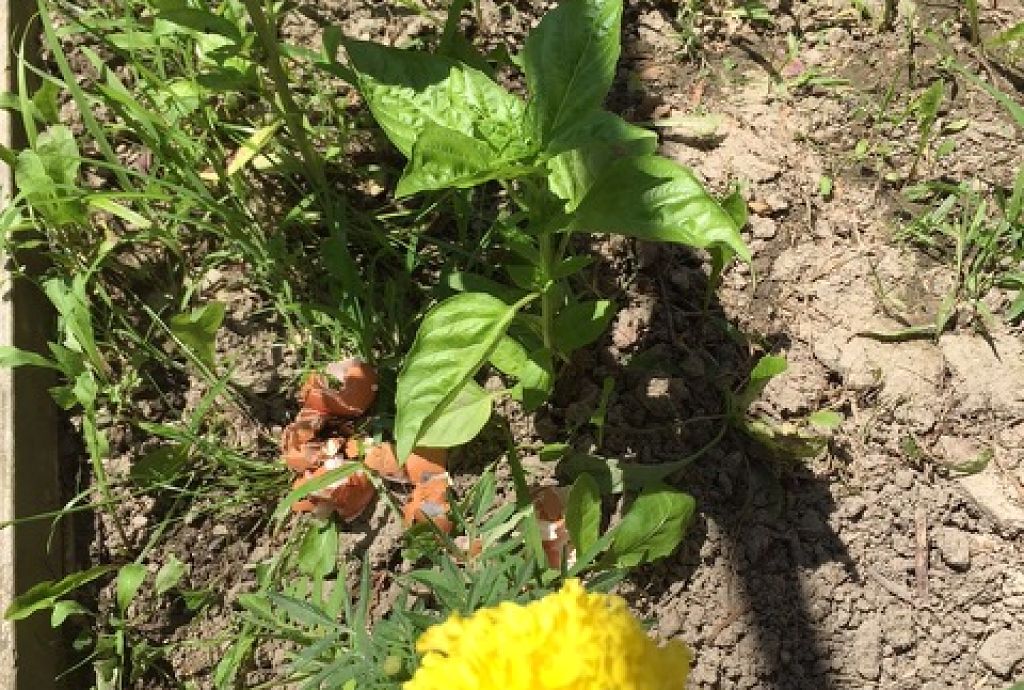Walking Joyously on Egg Shells

It’s summer here at our little cabin in the Catskill Mountains, and as I do every summer, I am attempting to grow some things in my little garden. As a self-proclaimed fair weather gardener, I have just two simple rules for myself—first, grow things either I or my family will eat joyfully, and second, grow things that have a high joy-for-me/frustration-for-me ratio.
I love basil and everything related to it—pesto, red sauce, caprese salad—and so, unfortunately, do slugs. I’ve tried a whole lot of ways to keep these slimy creatures off my basil–from planting marigolds nearby to strategically placing little containers of beer around the basil garden—and in my experience, none of them works perfectly. So I got intrigued recently when someone told me that placing broken eggshells around the basil plants would keep slugs from ever getting to them. Which got me to thinking about the ubiquitous metaphor “walking on eggshells” (which, apparently, slugs don’t like to do!). It has significance to both my own life and the question we’ve been asking here at CL and of our clients—how can we make failure more tolerable? Make it feel less risky?
Walking on egg shells generally implies being careful, timid, even fearful. When I was a girl, I walked on egg shells when I didn’t want to upset one of the adults in my life. Because I wasn’t sure what would happen if I broke one of the (explicit or implicit) rules or stepped outside the boundaries of what was acceptable, I worked hard to do the math—what are the chances of being wrong, looking stupid, feeling stupid, or just plain causing a mess I’ll have to fix somehow? And I acted accordingly. I think as young children many of us do that. We have very little power over those around us or over our environment, so we learn to tread lightly, to walk on eggshells as a means of self-protection, so that we get to feel good instead of bad about ourselves. This is both smart and what evolutionary scientists would call “adaptive.” The problem is that many of us carry this habit indiscriminately into our adulthood. Caution and “doing the mental math” is often a good approach (deciding not to get into a car with someone who has been drinking seems like a good idea, for example), but as we do with most habits, we tend to overuse them, forgetting to ask ourselves questions like “what if the thing that made sense before doesn’t make sense now?” As I think about the many leaders I’ve worked with over the years, I wouldn’t say they are exactly timid…do they really walk on egg shells? On the surface, perhaps not, but actually, many of them do spend a tremendous amount of time and effort attempting to avoid failure (all that time spent on trying to analyze and predict—think annual budgets, strategic plans, targets and scorecards, pilots).
It occurs to me that we don’t refer to “stomping on grapes” when we mean “being timid, fearful, or self-protecting.” Stomping on grapes sounds like, well, pure unadulterated joy! Why don’t we worry about getting stains on our feet as much as we worry about cutting our feet on egg shells? And what are the chances egg shells will really cut our feet anyway (I guarantee you, mine are calloused over enough to withstand much more than eggshells)? Are we afraid of breaking the egg shells? What is the danger of that? We don’t seem to worry about crushing grapes…they make wine. But egg shells make compost, rich soil in which new things grow, things that chickens can eat so they can make more eggs. Actually, eggs that become compost could ultimately become almost any sort of fruit or vegetable or flower we want, depending on how we cultivate it.
Of course, this is just a bit of a play with a common metaphor, but metaphors are powerful guides. They shape our thinking and our mindsets. So how about next time you or someone you support avoids experimenting because she is in some way “walking on eggs shells,” you remind her (or yourself), that eggshells make compost, and from compost you can cultivate plenty of new life—of whatever sort you want. Where there was fear, let there by joy! And basil.
Subscribe via Email